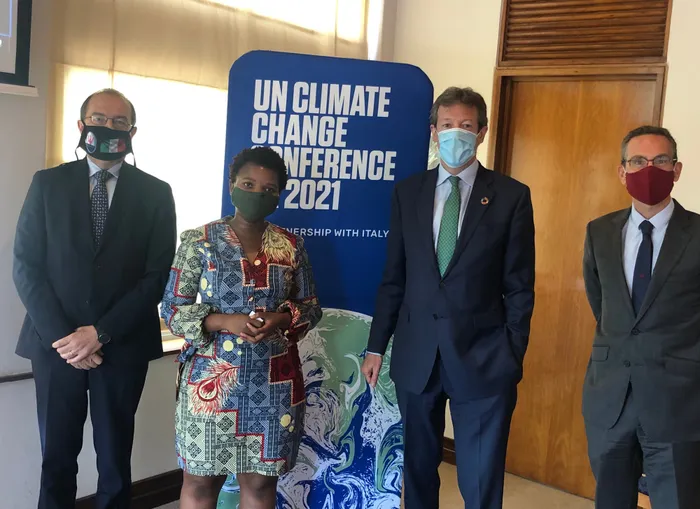Youth want inclusion in talks on ending global warming, effects of climate change

Italian Ambassador Paolo Cuculi; co-chairperson of the #Resilient40 youth climate activists group Khodani Mulaudzi; British High Commissioner Nigel Casey; and French Ambassador Aurelien Lechevallier at a media briefing on the eve of the 5th anniversary of the Paris Agreement and the Climate Ambition Summit 2020 co-hosted by the National Press Club yesterday. Picture: Val Boje
Pretoria - Young people are demanding a place at the international table of discussions about ending global warming and the effects of climate change because “they have effective ideas and innovations to offer”.
They can also see a lot of what the older generation cannot, and can thus add meaningfully to the debate on how to end the devastating effects of climate change, according to co-chairperson of the #Resilient40 youth activists group, Khodani Mulaudzi.
He was speaking during a discussion looking at the 5th anniversary of the Paris Agreement and the Road to Conference of the Parties (Cop 26) taking place next year.
The talk was hosted by The British High Commission and the National Press Club.
A member of the African youth climate network said they were ready to roll up their sleeves and fight the war against the Earth’s decline.
She said the time for young people to be left out of life-changing discussions which they would ultimately have to take on was over.
“Young people will not only be affected in the long run, but right now they have the innovations and solutions with which to tackle the problem. We can no longer be left sitting at the kids’ table. We want to be part of the decision-making and mitigating process. Sub-Saharan Africa is badly affected and experiencing some of the most severe effects of climate change, as is South Africa. These issues are not only hard on farmers and our grandparents who rely on water and fertile ground to feed families, but it also means young people suffer because of current and projected food shortages,” Mulaudzi said.
Speakers agreed that the continent was hard hit by global warming, adding that there was need for the voice of the continent to be strong in calling for mitigating measures at Cop 26 in Glasgow next year. British High Commissioner Nigel Casey said: “We are way ahead of where we should be in terms of greenhouse emissions.
This will hit us hard in many sectors, among them agriculture, infrastructure and the economy.
“Africa is already feeling the extreme effects of climate change, like the heatwaves which will only get worse.
“South Africa is also very affected, but we are very happy that this country has played a very pivotal role in discussions by leading negotiations for Africa.”
Casy said that the Paris Agreement of five years ago had been a milestone, in that it set the tone for action to be taken by all 194 countries who signed it.
“This was the first universal agreement, reached after an 11 year-negotiation to map out a way forward.” The agreement had been to pull resources together to limit global warming by 2°C by the end of the decade. “But we now sit at 4°C.”
The member countries had agreed to use what adaptation measures they had, including financial aid from public and private partners, to fight global warming, he said.
The agreement was ratified within a year (2016), signifying how important the UN had received it.
Mulaudzi asked that Glasgow and all discussions before that not be mere talk shows to avoid a situation where, in the future, the same issues would be brought to the table and no progress from previous ones celebrated.
“We are saying use the young people, otherwise the figures will only become higher and the situations, in particular for Sub Saharan Africa, worse.”
Pretoria News